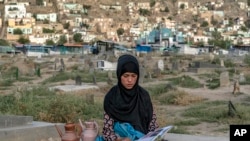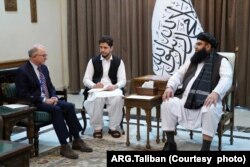On September 12, the United Nations Human Rights Council released its first report on the situation in Afghanistan since the Taliban takeover a year ago.
Afghanistan suffers a “deepening human rights crisis under Taliban rule that is leading to authoritarianism,” said Richard Bennett, the U.N.’s special rapporteur for human rights there.
Afghan authorities rejected the findings, with Taliban spokesperson Zabihullah Mujahid responding on Twitter.
“The report of the United Nations representative Richard Bennett on human rights is biased and far from reality,” he claimed. “Today, there is no threat to the life of women in Afghanistan … no one dishonors Afghan women.”
That is false. Taliban rights abuses, especially targeting women and girls, have been extensively documented by the U.N., rights groups and think tanks that follow Afghanistan.
The U.N. report debunks the Taliban’s claims that the rights of Afghan people are protected under the Islamic law in effect since the country’s 2004 democratic constitution was suspended and government and civil society oversight dissolved:
“Although the Taliban have repeatedly claimed that their administration is inclusive, it lacks gender, ethnic, religious, political and geographical diversity.
"The grand assembly of 4,500 religious scholars and clerics held in Kabul from 30 June to 2 July 2022, was a further missed opportunity to establish an inclusive political process. The all-male assembly was devoid of diversity and achieved little more than reaffirming support for the de facto authorities."
Under this patriarchal system, women and girls have “rapidly disappeared from all spheres of public life,” the report says. Instead, they have been victims of domestic violence, forced into child marriages, suspended from high schools and had professional licenses revoked.
Mandatory hijabs, a ban on wearing colored clothing, required male chaperones and other restrictions on women’s freedom of movement “significantly affect their ability to access health care and education, earn a living, seek protection and escape situations of violence,” the report states.
“Despite their pledge to allow all Afghan girls to return to school after 21 March 2022, they announced two days later that girls’ secondary schools would remain closed until policies and uniforms followed principles of Islamic law and Afghan culture. The Special Rapporteur notes with grave concern that this prohibits girls from attending secondary schools. Girls’ secondary schools are closed in 24 of 34 provinces, forcing about 850,000 girls from school.”
Adding a human dimension, the U.N. report gives voice to Afghans Bennett interviewed during his visit in the country.
“A young woman the Special Rapporteur met expressed her frustration, “During the last months, I wake up with tears. I tell myself this is a nightmare because the future looks darker every day. I had dreams to study finance and open my own clothing business. I wanted to travel to many countries and learn from them and bring this knowledge back to Afghanistan. From one day to another, mine and my friends’ lives and dreams were hijacked. I want the international community to remember that without them, we, the girls of Afghanistan, can never win this battle, alone.”
The Taliban's Islamic law permits girls under the age of 15 to be married, leading to a “surge of child marriages,” Bennett reported. On top of that, an alarmingly high number of female suicides and homicides requires “urgent study,” the report said.
“The Special Rapporteur met with women human rights defenders who had been harassed, detained and ill-treated for peaceful protest. Others have become victims of violence, enforced disappearance, ill-treatment and torture. To be released, some had to make video confessions, declare in writing they would not engage in any activities seen as harmful to the authorities and had their identity documents confiscated.”
The economic consequences for women have been harsh, the U.N. report says:
“The restrictions on Afghan women are disproportionately affecting their ability to sustain themselves, thereby further diminishing their enjoyment of other basic rights. In early 2021, about 17,369 women-owned businesses were creating over 129,000 jobs, over three-quarters held by women, and many more unregistered women-owned businesses operated in the informal economy.
“By March 2022, 61 percent of women had lost their job or income generating activities; the current restrictions are estimated to contribute to an immediate economic loss of between US$600 million and US$1 billion (about 3 to 5 percent of GDP). In the informal sector, women can no longer take products to market due to movement restrictions and the closure of many women’s markets.”
The report also says that women have been excluded from the country’s decision-making circles and judicial system, where they had made substantial inroads under Afghan democracy.
On July 19, for example, the Taliban’s Ministry of Finance said on Twitter that women had been asked to “voluntarily nominate” male relatives to replace them at their workplaces.
In August, Human Rights Watch said the international response to the Taliban’s treatment of women has been “inadequate” and called for more concrete steps to right the wrongs.
In July, Amnesty International issued a report on the plight of Afghan women under the Taliban, titled “Death In Slow Motion.”
Bennett’s report did not focus exclusively on women. Other findings included:
Reprisal killings: Although the Taliban claimed to have called a general amnesty after the April 15, 2021, takeover of Kabul, the report cites at least 160 extrajudicial killings of former Afghan government defense and security force members through June 2022:
“Residents of Nangarhar and Kunar provinces reportedly discovered over 100 bodies of men dumped in canals and other locations. The number killed is likely much higher, as family members of victims are often reluctant to report for fear of retribution.”
Minority rights: Ethnic Hazara Afghans, who practice a different form of Islam, are routinely persecuted. The report cites allegations of forced eviction, summary execution, religious taxation and enforced disappearances. People with disabilities or different sexual orientations face discrimination.
Children suffering: This group may be suffering the greatest harm under the Taliban. The report says “an estimated 9.2 million children [are] suffering malnutrition. Many families are utilizing harmful coping strategies, including the sale of children, child marriage, child labor and decreasing spending on healthcare and education.”
Freedom of speech and media: The right to independently report the news is sharply curtailed, and 84 percent of women media workers have been forced out of jobs. Six journalists have been killed, four wounded and more than 100 detained. Arbitrary rules are used to censor, abuse and intimidate journalists, and 15 provinces have seen 40 percent to 80 percent of their news outlets close.






